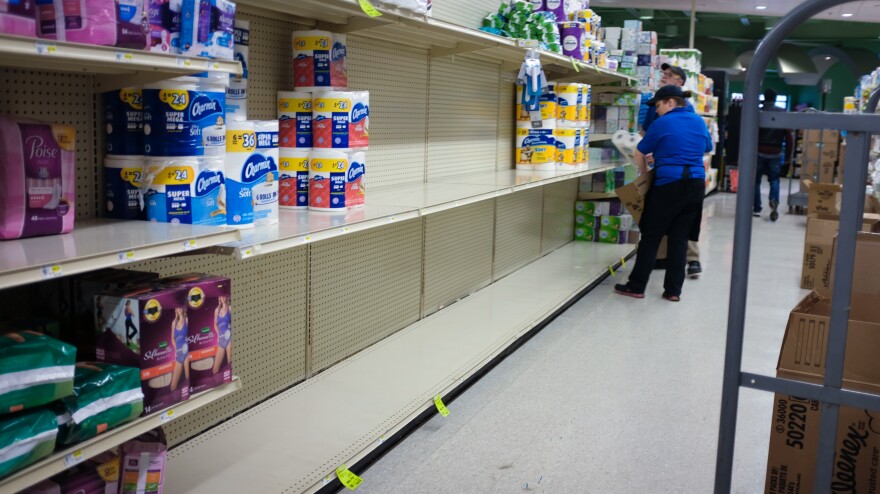As the coronavirus pandemic continues, workers are wondering what rights they have if (or when) their higher-ups request that they return to work. We asked Jennifer Sherer, director of the University of Iowa Labor Center about essential workers on the frontlines and evolving rules governing paid leave and unemployment benefits.
What kinds of questions have you been fielding at the Labor Center?
We’ve been hearing from workers whose concerns fall into three broad categories:
- We have thousands still on the job in Iowa who have health and safety concerns.
- People who have been laid off or are dealing with temporary shutdowns. For them I would say, even if you thought you wouldn’t be eligible for unemployment you should check again. New information from the federal government is coming out even as we speak.
- People who are trying to navigate how to take care of themselves and their families and figure out whether they have access to paid or unpaid leave.
When can you say “I don’t feel good about this situation,” if you’re an essential worker?
Both federal agencies (OSHA and CDC) have clear guidelines for best practices to prevent the spread of disease, and we’re trying to give those guidelines to workers who are concerned. Employers need to be providing everyone with access to materials needed for handwashing and sanitation and training about how to effectively use them. In some cases we’ve seen people change requirements for being absent: no longer requiring a doctor’s note for example. Other employers have been implementing practices like staggering shifts or lunch times to avoid bringing large numbers of people together. Lots of things can be taken from OSHA and CDC guidelines and implemented to make workplaces safer.
I work in retail and get two weeks of paid sick time and the ability to take time off if a family member is sick at home. My concern is that’s [leave for caring for family] unpaid. I’m uncomfortable going to work as it is. I play roulette with my health every day, and I have a high risk child at home. What can I do if I don’t want to go in to work anymore, but I need to support my family?
I want to say first that this is the heartbreaking story we’re hearing over and over again… and I send out admiration and respect to those on the frontlines. They are making exactly the choice of our caller every day. ‘I’ve got to have a paycheck, but I’m making a terrible choice every day.’ I wish I had a better answer. We do have a new federal leave law that just went into effect. He [caller] works for a big company offering up to two weeks of paid sick leave, and a new federal law offers up to 10 weeks of partially paid leave. But the law exempted any employer who has more than 500 employees. We’re still getting heartbreaking calls from those not covered, but changes are unfolding as we speak. Workers are taking forward these concerns and having some success with getting changes. Also, we’re still seeing state and federal laws change by the day. Workers should try to be part of that process at the local, state and federal level.
Are construction workers essential?
I’m not certain that construction is categorized as essential. States are making their own designations of which are essential employees. Beyond that, employers in those industries are also making decisions. Having heard from a pretty good cross section of workers in this industry, we’re seeing a range of responses. Some construction sites are still up and running, some are operating with fewer people and some are shut down.
What are leave options for employees considered essential?
The Iowa Federation of Labor put out a survey about this and got a variety of responses. For example, 'I have a compromised immune system, but because I can’t afford to be off I need to go back to work.' 'I am not so much worried about myself as my 2 year old son and pregnant wife.' There was one situation where the wife is a healthcare worker and her spouse works in manufacturing. They're trying to prepare and juggle. She clearly is in an essential occupation, so how can he take leave while she works her essential shift since their child care isn’t running fulltime.
First, find out what your employer's policy is. We still have the Family and Medical Leave Act in place. But it only kicks in once someone is ill. A new federal law is intended to provide up to two weeks of paid sick leave, but it only applies to employers with under 500 employees. Some employers are stepping up and offering at least that amount of leave to help our entire workforce deal with this. Our collective expectations for employers are being elevated in this moment.
What can you say about this transition for so many to working from home? What are the chief labor issues when transitioning?
Right now particularly, so many educators are struggling with working harder than ever, connecting with students and families, while also juggling obligations at home. This pandemic is reminding us of the value of people’s work and the people who are out working today have been undervalued in many ways. What is the whole world of work going to look like after this?
In some cases we’re calling some of the lowest paid workers “essential.” They were essential even before they officially earned that designation. The burden of exposure and risk and loss of income and health insurance is being born by both the most vulnerable and those whose work is most essential in keeping things running right now.







